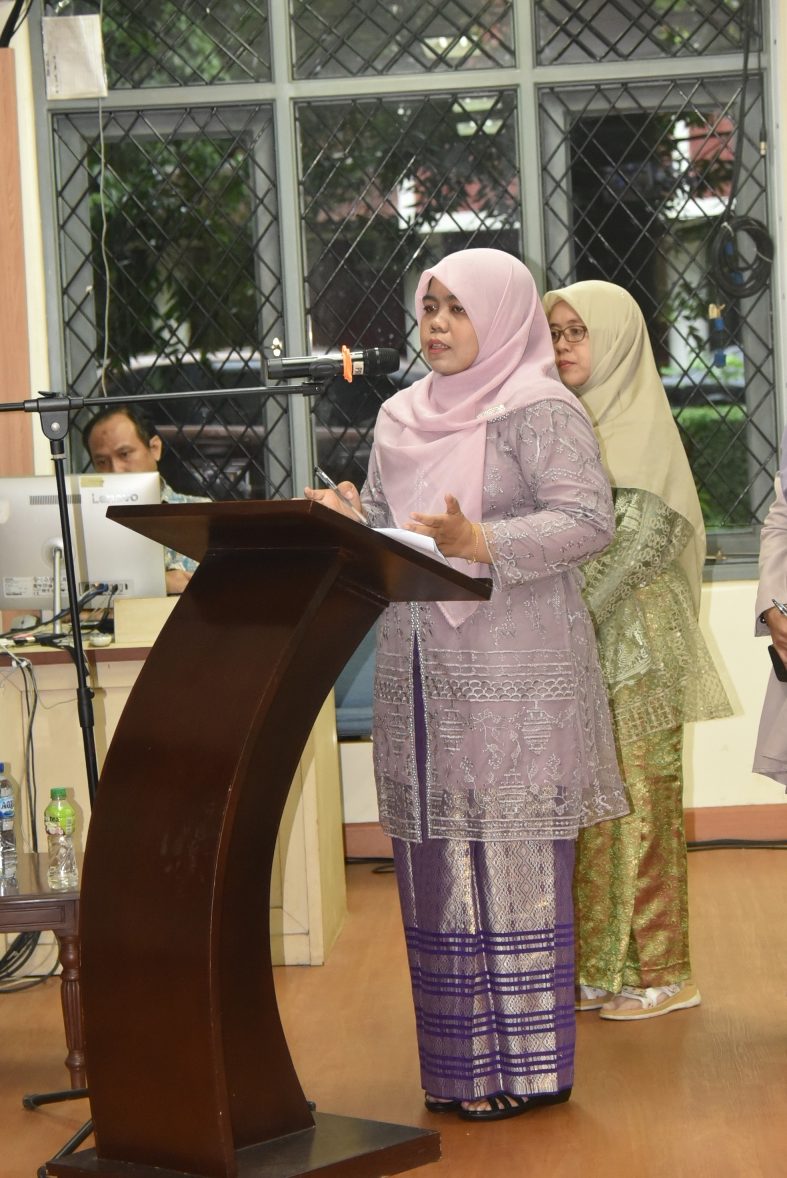On June 27-28, 2024, the Faculty of Public Health (FPH) Universitas Indonesia (UI) held an open doctoral promotion session with the candidate Ridha Restila. On Friday, June 28, 2024, Ridha successfully presented and defended her dissertation before the examining committee. The session, chaired by Dr. dr. Tri Yunis Miko, M.Sc., was conducted in a hybrid format at the Doctoral Promotion Room, FPH UI Building G, and via Zoom Meetings. The session was attended by Prof. Drs. Bambang Wispriyono, Apt., Ph.D., as the Promoter, and Dr. drg. Ririn Arminsih, M.Kes., and Prof. Dr. Umar Fahmi Achmadi, M.P.H., Ph.D., as Co-promoters.
Ridha’s dissertation research, titled “The Bacteriological Relationship of Drinking Water in the Kuantan River Basin and Fecal Myeloperoxidase on Indications of Growth Disorders in Height among Toddler Age Children,” aimed to explore the bacteriological relationship of drinking water based on the examination of Escherichia coli (E.coli) and identify inflammation from pollution (fecal myeloperoxidase) as it relates to growth disorders in height among children aged 24-59 months living in river basin areas. Children living in river basin areas are known to be vulnerable to the adverse effects of unhealthy environmental conditions.
This dissertation research used a cross-sectional study design and indicated growth disorders in height based on changes in Height-Age-Z Scores over a 6-month period. The findings showed that 47.2% of the E.coli levels were at high-risk and unsafe levels. The median fecal myeloperoxidase level was 16.95 ng/mL (ranging from 0.61 ng/mL to 1981 ng/mL). The Prevalence Ratio of FMPO for growth disorder indications at the cutoff point value of 52.16 ng/mL was 1.22 (0.91-1.62).
“Over the 6-month observation period, there was a tendency for a decline in the average HAZ score of children, and 83 toddlers, or 57.6%, showed a decline in their HAZ score,” Ridha stated. A decrease in HAZ scores indicates growth disturbances in children and may lead to catch-up growth if not intervened promptly. The bacteriological examination found that 70.1% of drinking water samples were positive for E.coli. Multivariate analysis revealed that drinking water contaminated with E.coli at high-risk and unsafe levels could increase the risk of children experiencing growth disturbances by 1.39 (1.05-1.85) after controlling for variables such as sanitation, hygiene, digestive inflammation, socio-demographic factors, infection history, and food intake.
Based on the findings, Ridha recommended that the government consider improving the provision of safe drinking water in river basin areas and enhance surveillance of household drinking water quality. This surveillance could monitor the quality of drinking water consumed by households across physical, chemical, and microbiological parameters, thus enabling control of risk factors.
Ridha Restila is a faculty member of the Public Health Department at the Faculty of Medicine, University of Riau (FK UNRI), who completed her Master’s and Doctoral education at the Faculty of Public Health, University of Indonesia. She has successfully published 20 scientific articles and book chapters. Ridha’s dissertation research provides valuable information about the effects of EE/EED (Environmental Enteropathy/Environmental Enteric Dysfunction) and household environments on the growth of children aged 24-59 months living in river basin areas. It also contributes to knowledge on the identification of EE/EED biomarkers through non-invasive methods for children.
Following discussions among the session chair, promoters, co-promoters, and the examination team, consisting of Dr. Al Asyary, S.K.M., M.P.H.; Prof. Dede Anwar Musadad, S.K.M., M.Kes.; Defriman Djafri, S.K.M., M.K.M., Ph.D.; and Dr. Miko Hananto, S.K.M., M.Kes., it was concluded that Ridha successfully passed as a Doctor of Public Health and earned the Cum Laude designation with a GPA of 3.9. “Congratulations on your achievements thus far, and the degree you have earned marks a new beginning for you to contribute as an academician with a deeper research capacity than before,” stated Prof. Bambang Wispriyono, the Promoter. (DFD)

